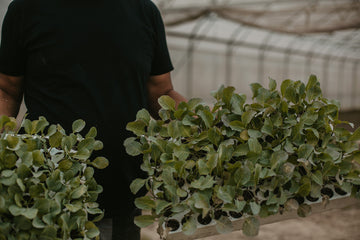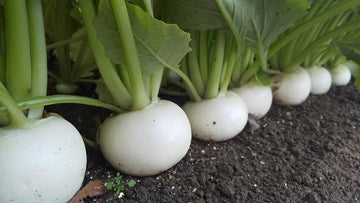NOTES FROM OISHII NIPPON
Explore the blog posts below for variety information, recipes, grower profiles, culture notes, and more.
Growing Tips
Growing Tips: Transplanting
Learn about transplanting: why we sometimes recommend it, which varieties should be transplanted, and how to do it.
Read more
Growing Tips: Sweet Kabù
Learn how to grow the sweet, succulent salad turnip, Sweet Kabù. A quick 35-45 days, no transplanting required.
Read more
Three Tips for Sowing Shishimai Pepper
Ready to sow your Shishimai pepper seeds? Here are three tips to get your seeds started successfully.
Read more
Sowing Negi Seeds
Yukiho from the Tokita research station demonstrates how to successfully germinate your Negi seeds using cell trays.
Read more
Growing Tips: Saku Saku
Saku Saku, meaning "crispy" is a sweet salad cabbage. Easy to grow in spring or fall, this variety holds well in the field and offers layers of paper-thin, crisp leaves selected for their raw eating quality. Learn more about growing tips for this salad cabbage.
Read more
Transplanting Saku Saku Cabbage
You've successfully sown your Saku Saku and seen them sprout out of their seed coats, or maybe you've bought cabbage seedlings at your local farm or garden center—what's next?
Read more
The Many Types of Negi
Is Negi the same as scallions, or green onions? How are they related to Leeks? How many types of Negi are there? “Negi” can be a confusing term as it is used to describe a few different types of Allium fistulosum. When translated, Negi becomes “green onion”, but this doesn’t work too well when you dig deeper.
Read more
How does "hilling" work in Negi production?
For the characteristic long white stalk – the blanched portion is where the subtle sweet allium flavor is – Negi must be "hilled", sort of like you would when growing potatoes. Soil is pushed to cover the plants so only the green tip is exposed, making the plants elongate further to reach for sunlight. Read on to learn more about how Negi is hilled in Japan.
Read more
Harvesting: Zuccurì
Chris takes us to Beloian Farms in the Central Valley of California, an organic farm that grows Zuccurì. We will find out what to look for and learn how to detect when it is ready to harvest.
Read more
Growing: Zuccurì
Today Chris takes us to his farm, San Benito roots in Hollister, CA to breakdown Zuccurì growing. Sometimes it can be hard to gauge how your plants are doing and what to do if they need some assistance. Chris gives us tips on how to check on plant health and production and how to mitigate issues in the garden or field.
Read more
Negi Cultivation
In this video, Chris takes us through Negi cultivation and shows us how to get the most out of our Negi crop. We lear...
Read more
Harvesting: Shishimai
Chris takes us to Tomatero Farms in Watsonville, California where they are growing organic Shishimai peppers. Their process is organic, over plastic and under hoophouses. Chris explains how and when to harvest Shishimai and gives us some pointers for getting the most from our plants.
Read more












